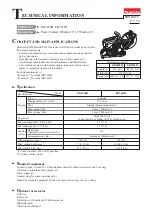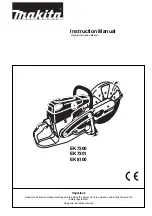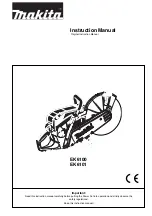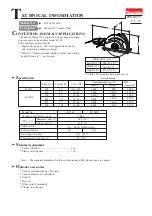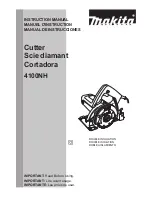
7
–
Place the bottom flange (26) with the camber facing upwards
onto the threaded shaft (24). In doing so, align the hole in the
flange (25) with the hole in the cover (23).
–
Push an appropriate tool through the ho e in the flange (25) and
the hole in the cover (23) to block the threaded shaft.
–
Screw the cord spool housing (27) onto the threaded shaft (24)
(lefthand thread).
Mounting the blade (see fig. 5)
Risk of injury (cuts from sharp edges)!
On the protective shield there is a sharp knife for cutting off
the cord. Protective gloves must be worn for all work on the
blade.
–
Place the bottom flange (26) with the camber facing upwards
onto the threaded shaft (24). In doing so, align the hole in the
flange (25) with the hole in the cover (23).
–
Place the bottom flange (26) with the camber facing upwards
onto the threaded shaft (24). In doing so, align the hole in the
flange (25) with the hole in the cover (23).
–
Push an appropriate tool through the hole in the flange (25) and
the hole in the cover (23) to block the threaded shaft.
–
Position the blade (28) on the bottom flange (26).
–
Place the top flange (29) with the camber facing upwards onto
the threaded shaft (24).
–
Screw the nuts (30) onto the threaded shaft (24) (left-hand
thread).
Mounting the carrying strap (see fig. 6)
–
Hang the carrying strap (31) from the mounting
hook.
USING THE MACHINE FOR THE FIRST TIME
Topping up the product with the fuel-oil mixture
DANGER
Danger of fire!
Fuel is highly flammable. Before refuelling, switch off the motor
and let it cool down. Closely observe all safety information for
handling fuel
–
Set down the product on an even surface with the tank cover
(12) facing upwards.
–
Slowly open and remove the tank cover (12).
–
Carefully top up the fuel-oil mixture (max. 1 l). Do not spill!
–
☞
Usable fuels
–
Check the seal in the tank cover (12) for damage and clean
if necessary. Replace a damaged seal immediately!
–
Re-tighten the tank cover (12) by hand.
Operation
Check before starting!
Check the safety devices and the safe condition of the
product (particularly protective shield and cutting tool):
–
Check whether there are visible defects (broken parts,
cracks, etc.).
–
Check whether all parts of the product are firmly attached.
–
Check that the safety devices are in faultless condition.
–
Check that there is no leakage.
Starting the motor (cold)
–
Set the ignition switch (14) to ON.
–
Repeatedly press the fuel pump (32) until no more
bubbles appear in the fuel hoses (approx. 10 times).
–
Pull the cold start lever (11) completely to the top .
–
Position the throttle (16) to half position. Press the
throttle block (17) and throttle (16) at the same time and
keep pressed. The throttle block (17) must engage!!
–
Hold the product by the shaft pipe with your left hand.
–
Slowly pull the pull-starter (13) straight until you feel a
resistance and let it run back in.
–
Pull out the pull starter again (13) quickly and forcefully
until the motor starts up.
–
Bring the cold start lever (11) to its bottom position .
–
Let the motor idle for approx. 30 seconds before starting
to work.
Warm starting the motor
–
When starting the warm motor, do not actuate the cold
start lever (11) (bottom position )
.
–
Pull out the pull starter again (13) quickly and forcefully
until the motor starts up.
–
If the motor does not start up after pulling the pull-start
(13) three times, repeat the starting procedure as described
under Cold start (
☞
Starting the motor (cold)
Switching off the motor
–
Set the ignition switch (14) on the operating handle to
OFF.
•
The motor switches off.
MAINTENANCE
Cleaning and maintenance at a glance
Before each use
What?
How?
Ensure that all parts are firmly seated.
Retighten all connections using a suitable tool.
Check for fuel leakage.
Examine all fuel-carrying hoses and containers for leakage.
Check cutting tool for damage.
Examine cutting tool for cracks, deformations and damage.
Never operate the product with a damaged cutting tool.
After each use
What?
How?
Clean the device
See following page





















